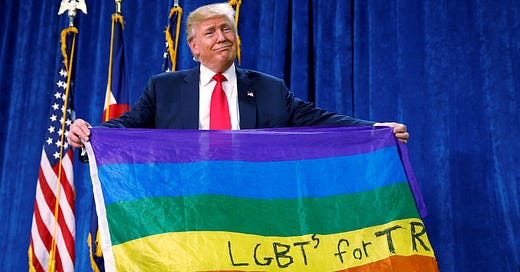Can Republicans Turn Back American Support for Gay Rights?
Even if the GOP ends up supporting legislation to protect same-sex marriage, its jihad against trans rights and "grooming" potentially endangers all queer people.
The climate for LGBTQ rights in America has, by all appearances, suddenly become alarming. Classic anti-gay rhetoric, such as the claim that queer people are “grooming” children, have made a violent return in uproars over schools and medical care for trans youth. The Supreme Court’s overturning of Roe v. Wade, and specifically Clarence Thomas’ concurring opinion, have reminded Americans that what were considered settled rights are vulnerable to a highly organized, decades-long right-wing legal movement. But until basically yesterday, gay marriage was considered a point of relative cultural agreement, the miracle issue on which Americans changed their mind en masse almost—at least in historical terms—overnight. Public opinion surveys continue to find new record percentages of Americans—most recently, 70 percent in 2021—support gay marriage, including 55 percent of Republicans and a solid majority in all age groups. That is reflected in the fact that 47 House Republicans helped pass a new bill repealing the old, anti-gay Defense of Marriage Act and codifying gay marriage into law.
Now, the question is: is this relative consensus as secure as it appeared? Is it strong enough to force American politicians to protect the right to gay marriage against the right-wing Supreme Court, which clearly has no compunction about ruling against things a majority of Americans support? (Support for legal abortion is, after all, only nine percentage points lower than gay marriage.) Is this “culture war” really won the way so many people—myself included—quite recently believed it was? Even if it is, is that enough?
The answer may come down to this: what will the Republican Party do about it? How the House bill passed on Tuesday fares in the Senate, where it needs 10 Republican votes to pass, will be revealing. The fact is that gay marriage remains an unsettled issue in the GOP and among conservatives and “red” Americans more broadly. In the post-Trump era, the Republican Party continues to be driven by its radical right-wing faction, and has reignited culture wars that Trump himself largely left to the side. Will the party side with gay marriage as a done deal, a settled issue, or will the new energy on the culture-war right undo the tentative, perhaps fragile support for gay marriage among conservatives?
First of all, it’s worth remembering the way that “acceptance” of gay marriage—let’s keep it in scare quotes for the moment—unfolded on the right. In 2004, George W. Bush ran against gay marriage hoping to excite evangelicals and flip a few black votes, and it’s widely believed that this “wedge issue” played at least some role in his victory. After the Supreme Court’s Obergefell decision in 2015 that legalized gay marriage across the U.S., Republicans dropped what had been one of their signature culture-war issues almost overnight. As Benjy Sarlin points out, the way this went down was rather unusual:
What’s odd about this evolution, though, is that at no point during the long journey from Republicans warning that “activist judges” would destroy “traditional marriage” to the RNC tweeting Pride Month celebrations did the party ever acknowledge their position shifted. Few prominent Republicans explicitly said they had changed their mind from the Bush era. The national GOP platform still opposes gay marriage.
Republicans simply dropped their crusading against gay rights without explanation, it disappeared from the talking points on Fox News, and over the next decade, Republican voters’ support for gay marriage climbed an astonishing 20 percent points, from the mid-30s to the mid-50s, faster than Democrats or the country as a whole. Donald Trump appeared on the campaign trail with rainbow flags.
The party’s silence on gay marriage—and Trumpism’s ostensible focus on economic issues, “globalism,” etc—may have allowed that shift to take place. I suspect many “red” Americans followed a similar arc as the politicians they vote for. The Supreme Court ruled, the battle was over, and they resigned themselves to it without necessarily agreeing with it. In the ensuing decade, LGBTQ visibility increased dramatically, more of their kids came out, and gay-married people became an increasingly normal part of their lives. By then, even many conservative Americans, whether or not they changed their personal views, had probably softened enough to think existing marriages shouldn’t be undone. (Texas senator Ted Cruz said something along these lines this week: “You’ve got a ton of people who have entered into gay marriages and it would be more than a little chaotic for the court to do something that somehow disrupted those marriages that have been entered into in accordance with the law.”)
And yet, we should not overlook the fact that this “acceptance” in red America—again, very roughly speaking—is often still tentative and conditional. Coming out in a red area is still not the same as even, say, small-town Massachusetts; you are much more likely to be greeted with a live-and-let-live, agree-to-disagree kind of response that, while preferable to outright homophobia, is not true acceptance. (Basically, it treats homosexuality as an ideological issue to “disagree” about rather than something central to the identity of another person, even a close family member.) If you’re a teenager, you may still be rejected by your family or, slightly better, shuffled into the current evangelical ideology of sexual abstinence for queer people. People would often really prefer that homosexuality remain an old-fashioned unmentionable even if it is tolerated, and still see coming out as “making your sexuality an issue,” blind to how heterosexual people “make their sexuality an issue” without ever giving it a thought. This does not mean the evolution in how they think about gay people and gay marriage is insincere, just that it may be tentative and complicated, still at odds with the evangelical Christian folkways that dominate even not-that-religious red Americans. And remember there’s still almost half of Republicans—45 percent—who still don’t support gay marriage at all.
Now that Trump and his trade-focused culture-war politics have moved to the sidelines, the radicalized GOP has rediscovered the potency of sexuality culture wars, and have specifically used trans rights and education to revive their old anti-gay politics. Led by emboldened social conservatives like Rod Dreher, they have tried to paint LGBTQ rights as a whole, or “wokeism” as a sweeping ideology that is remaking American institutions root and branch and “grooming” their children (an old anti-gay slogan). Social conservative activists like Christopher Rufo, a major force behind state-level anti-gay legislation, have become overnight stars on the far right. This kind of hysteria has proved popular at the grassroots level and revealed, once again, how good conservatives are at fighting for every last inch of political terrain (particularly the local and state levels the Democratic Party often abandons). Now that the social-conservative right has won its long game of overturning Roe, there may be appetite for more—and, in any case, the Supreme Court may decide on its own to throw out Obergefell.
Given how skewed the American political system is toward Republican power, how gerrymandered legislatures are, and how stacked the judiciary is with right-wing activists, it would be theoretically possible for the GOP to mount an attack on gay marriage even if only a minority of its constituency supported it. My guess, though, is that it will try to split the difference. Even though Republican senators are currently hemming and hawing about whether they will support the House gay marriage bill, there doesn’t seem to be much appetite among elected Republicans to reopen the gay marriage issue. They would rather continue not talking about their position, but a Senate vote will force them to do so. So they may be able to safely support gay marriage as the relatively more conservative alternative to more “radical” things like trans rights which are much more politically controversial. If the Senate GOP helps pass the gay marriage bill, it might evacuate some of the pressure that is building on the left in backlash to the Supreme Court without hurting them with their own voters—and allow the anti-trans jihad to continue. The GOP might be able to do itself a small favor by acting in step with the majority of public opinion: solidly behind gay marriage, much more skeptical of trans rights.
Religious conservative intellectuals and activists, though, really don’t see much of a difference between the two, and are clearly trying to make all gay rights issues part of a single crusade for “protecting children” from “gender ideology” and “grooming” as has been done in repressive regimes like Poland and Hungary. Many of these figures are explicitly touting Viktor Orban’s Hungary as a model for the U.S. The Central European anti-gay playbook may, unfortunately, resonate with a lot of the American public’s skepticism toward trans rights, some of which focuses on trans children (and the misguided notion that they frequently later change their mind if allowed to transition too young). While the anti-trans jihad is disgusting and horrifying in its own right, it will be even more alarming if it is successfully turned into a sweeping anti-gay project.
Gay marriage may ultimately be saved by its conservatism—by the fact that, in the end, it really asks society to change rather little, and channels queer people into the dominant heterosexual framework. But that doesn’t at all mean that LGBTQ rights in general are safe in America, or that we should be content with nothing but this bare-minimum legal protection. I will leave it to the wonks to decide how actually-existing politicians should thread the difficult needle of persuading the public on a broader conception of queer rights, including anti-discrimination and other protections for trans people. But right-wing backlashes eventually come for all of us. (Just look at the way some of these people are all but openly gloating about gay men getting Monkeypox).
They may be able to persuade some of those who had been trending toward support for gay rights to revert to their old anti-gay beliefs, or to express them in a new way. Nothing less than a bold, imaginative, and unapologetic defense of sexual freedom and autonomy is enough to fight back.







